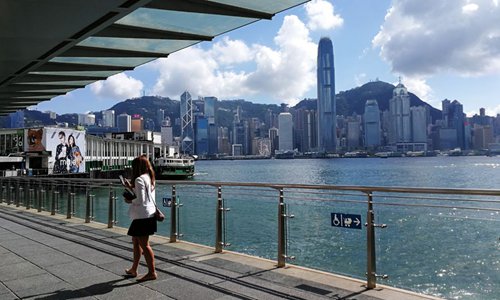HOME >> BUSINESS
Global rating agency’s politically biased decision ‘harms itself’
By Li Xuanmin Source:Global Times Published: 2019/9/8 22:58:39

A woman walks near the Harbour City in Hong Kong, south China, Aug. 27, 2019. (Photo: Xinhua)
Major global rating agencies are waging a rating "cold war" against emerging economies by letting their rating decisions be overshadowed by political bias to serve the interests of the developed world, Chinese analysts said on Sunday, warning that this could seriously taint their credibility.
The comment came after US rating agency Fitch downgraded Hong Kong's long-term foreign-currency issuer default rating to AA from AA+ with a negative outlook on Friday, taking the "one country, two systems" model in the special administrative region rather than the riots that swept across the city in recent months as key rating drivers.
The decision has sparked mounting dissatisfaction in China's financial industry, with some insiders throwing doubt on the independence and fairness of global rating agencies, all of which are headquartered in the US.
Fitch said in a statement sent to the Global Times that it expects the "the gradual rise in Hong Kong's economic, financial, and socio-political linkages with the mainland implies its continued integration into China's national governance system, which will present greater institutional and regulatory challenges over time." The development could lead to a narrowing of the sovereign rating differential between Hong Kong and the Chinese mainland, it claimed.
Dong Shaopeng, an expert advisor for the China Securities Regulatory Commission, described Fitch's downgraded rating for Hong Kong over the SAR's rule of law as a move full of political bias that exposed US firms' long-arm jurisdiction and political interference into a country's internal affairs.
"If you want to rate Hong Kong, then please include relevant indicators such as financial market openness, financial risk management ability and business convenience. Why did Fitch cite such an irrelevant thing as the political system to support its analysis?" Dong told the Global Times, adding that Fitch's move was part of a "cold war" that aims to maliciously crack down on emerging and developing economies such as China.
Another industry insider, who works for a financial institution in Hong Kong, predicted that more similar moves by other global rating agencies that question Hong Kong's rule of law could be announced in the near future.
"We all know the weight of global rating firms' voices in the financial industry. So this is a boxing combination, with targets to shake Hong Kong's role as a global financial hub," he told the Global Times on Sunday on condition of anonymity, indicating that such designs could be aimed at curbing China's bridge to the world. He pointed out that by doing so, those firms are putting their long-established reputations at risk and will eventually pay a price for making politically motivated decision.
Fitch did not comment as of press time.
Dong added that the assessment by global rating agencies is completed in the systems of major developed economies to serve those nations' interests, which is totally unfair to the developing world.
In September 2017, another US rating agency S&P Global Ratings cut China's long-term sovereign credit rating by one notch to 'A+' from 'AA-', saying its prolonged period of strong credit growth has increased its economic and financial risks.
China's Ministry of Finance rebutted S&P's downgrade at that time, calling it a "wrong decision" that showed a misjudgment of the Chinese economy based on global rating firms' conventional thinking and narrow understanding of only developed economies.
"We need an overhaul in the global rating system. Otherwise the developing world should form their own rating firms that respect every country's political system and that know emerging economies well," Dong said.
Posted in: INDUSTRIES